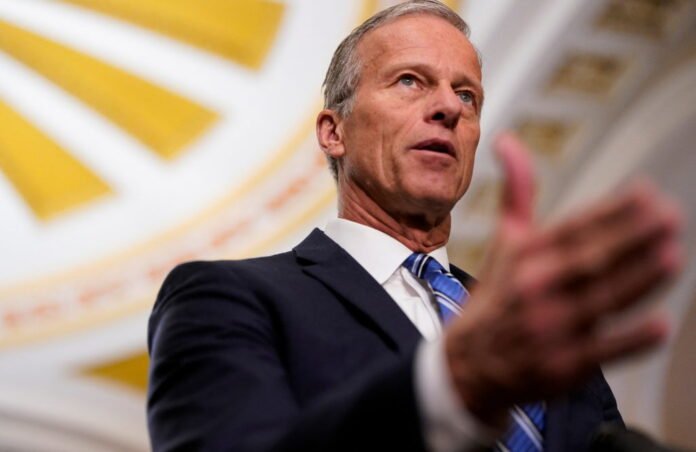House Republican leaders are mobilizing their party members around a plan to implement a significant portion of President Donald Trump’s policy agenda, following the Senate’s passage of a key legislative framework early Saturday morning.
“Over a year ago, the House began discussing a reconciliation package aimed at reducing the deficit, securing our borders, maintaining low taxes for families and job creators, restoring American energy dominance, strengthening national security, and making government more accountable to the people. We are now one step closer to achieving those goals,” Speaker Mike Johnson (R-La.) and other House leaders wrote in a letter to their colleagues.
“Today, the Senate passed its version of the budget resolution, and next week, the House will consider the Senate’s amendments,” they added.
Republican lawmakers are using the budget reconciliation process to push for a conservative policy overhaul. This method, typically employed when one party controls all three branches of government, reduces the threshold for Senate passage of certain fiscal measures from 60 votes to a simple majority of 51. Reconciliation is often used to pass large, sweeping policy changes in a single or a few major pieces of legislation.
The Senate passed a framework for a reconciliation bill just after 2 a.m. ET on Saturday following extended debate and votes on amendments. While similar to the version the House passed in late February, the Senate’s approach includes mechanisms that avoid accounting for the cost of extending Trump’s 2017 tax cuts and a lower baseline for required federal spending cuts, prompting some House conservatives to threaten opposition.
The Senate’s version proposes at least $4 billion in spending cuts, while the House’s version calls for cuts in the range of $1.5 trillion to $2 trillion. Both bills prioritize Trump’s policies on border security, energy, and tax reforms, such as eliminating penalties on tipped and overtime wages.
“If the Senate’s version of the budget comes to the House floor, I will vote against it,” said Rep. Chip Roy (R-Texas). “While the Senate’s budget sets a great top-line message about returning spending to pre-COVID levels, it lacks enforcement mechanisms and appears to be designed to avoid achieving that goal.”
Despite these concerns, House GOP leaders assert that the Senate’s passage of its framework simply allows the House to proceed with refining its version of the bill passed earlier this year, without interfering with the overall process.
“The Senate’s amendment does not change the House’s reconciliation instructions that were voted on weeks ago,” the letter stated. “While the Senate has taken a different approach, the amended resolution does not prevent us from achieving our final goals in the reconciliation bill.”
House leaders reiterated that the final bill must include historic spending reductions while protecting essential programs to secure their support for passage.
GOP leaders emphasized that the passage of the framework is just the first step in a lengthy process, laying out broad instructions on spending. With both the House and Senate now having passed similar frameworks, the next phase involves congressional committees working on the specifics of the final reconciliation bill within their respective jurisdictions.
“We will not accept a process that pits the House against the Senate, resulting in a ‘take it or leave it’ proposal,” House leaders warned. “Once the House adopts the budget resolution, our committees will work together with the Senate to prepare the bill’s provisions for markup.”
House leaders remain committed to having a bill ready for Trump’s approval by the end of May. House Budget Committee Chairman Jodey Arrington (R-Texas) criticized the Senate’s resolution, calling it “unserious and disappointing” for its modest cuts. However, he expressed a willingness to work with colleagues to address concerns and ensure the final reconciliation bill promotes fiscal responsibility and strengthens the nation’s security and prosperity.
“I am committed to collaborating with President Trump, House leadership, and Senate counterparts to ensure the final bill makes America safer, more prosperous, and fiscally responsible again,” Arrington said.
For more political updates, visit, DC Brief.


